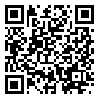Volume 22, Issue 3 (6-2023)
JRUMS 2023, 22(3): 243-258 |
Back to browse issues page
Ethics code: IR.IAU.AHVAZ.REC.1401.097
Download citation:
BibTeX | RIS | EndNote | Medlars | ProCite | Reference Manager | RefWorks
Send citation to:



BibTeX | RIS | EndNote | Medlars | ProCite | Reference Manager | RefWorks
Send citation to:
Jafari S, joharifard R. The Effectiveness of Intensive Short-Term Dynamic Psychotherapy on the Alexithymia, Defense Styles, and Ego Strength in Patients with Irritable Bowel Syndrome: A Quasi-Experimental Study. JRUMS 2023; 22 (3) :243-258
URL: http://journal.rums.ac.ir/article-1-6877-en.html
URL: http://journal.rums.ac.ir/article-1-6877-en.html
Assistan professor Assistan professor Psychology Department, Ahvaz Branch, Islamic Azad University, Ahvaz, Iran
Abstract: (2412 Views)
Background and Objectives: Irritable bowel syndrome (IBS) is one of the digestive diseases that is associated with psychological causes, and dynamic treatment can play an effective role in improving psychological symptoms. Therefore, the present study aimed to determine the effectiveness of intensive and short-term dynamic therapy on alexithymia, defence style, and ego strength in patients with IBS.
Materials and Methods: The research method was quasi-experimental. The research population was all IBS patients referred to internal clinics in Andimshek in 2022. Thirty people were selected by convenience sampling and randomly assigned into experimental (15 subjects) and control groups (15 subjects). The experimental group received dynamic therapy for fifteen 90-minute sessions, while the control group did not receive any intervention. Two groups were evaluated in three stages using the Alexithymia, Defense Styles, and Ego Strength Questionnaires. Data were analyzed using two-way repeated measures analysis of variance (ANOVA).
Results: The average scores of defense styles, alexithymia, and ego strength before the intervention were 72.25, 58.36, and 24.08 in the treatment group, and 72.12, 59.16, and 23.52 in the control group, respectively (p>0.05), but after the intervention, the average scores of ego strength showed a significant increase in the treatment group compared to the control group, while defense styles and alexithymia significantly decreased (p<0.001).
Conclusion: The results of the study indicated the effect of intensive and short-term dynamic therapy on the improvement of psychological symptoms in the experimental group. With caution, it is recommended to use this intervention as a complementary treatment for irritable bowel syndrome.
Key words: Intensive and short-term dynamic psychotherapy, Alexithymia, Ego strength, Irritable bowel syndrome, Defense styles
Funding: This study did not have any funds.
Conflict of interest: None declared.
Ethical approval: The Ethics Committee of Azad University of Ahvaz approved the study (IR.IAU.AHVAZ.REC.1401.097).
How to cite this article: Jafari Soheil, Joharifard Reza. The Effectiveness of Intensive Short-Term Dynamic Psychotherapy on the Alexithymia, Defense Styles, and Ego Strength in Patients with Irritable Bowel Syndrome: A Quasi-Experimental Study. J Rafsanjan Univ Med Sci 2023; 22 (3): 243-58. [Farsi]
Materials and Methods: The research method was quasi-experimental. The research population was all IBS patients referred to internal clinics in Andimshek in 2022. Thirty people were selected by convenience sampling and randomly assigned into experimental (15 subjects) and control groups (15 subjects). The experimental group received dynamic therapy for fifteen 90-minute sessions, while the control group did not receive any intervention. Two groups were evaluated in three stages using the Alexithymia, Defense Styles, and Ego Strength Questionnaires. Data were analyzed using two-way repeated measures analysis of variance (ANOVA).
Results: The average scores of defense styles, alexithymia, and ego strength before the intervention were 72.25, 58.36, and 24.08 in the treatment group, and 72.12, 59.16, and 23.52 in the control group, respectively (p>0.05), but after the intervention, the average scores of ego strength showed a significant increase in the treatment group compared to the control group, while defense styles and alexithymia significantly decreased (p<0.001).
Conclusion: The results of the study indicated the effect of intensive and short-term dynamic therapy on the improvement of psychological symptoms in the experimental group. With caution, it is recommended to use this intervention as a complementary treatment for irritable bowel syndrome.
Key words: Intensive and short-term dynamic psychotherapy, Alexithymia, Ego strength, Irritable bowel syndrome, Defense styles
Funding: This study did not have any funds.
Conflict of interest: None declared.
Ethical approval: The Ethics Committee of Azad University of Ahvaz approved the study (IR.IAU.AHVAZ.REC.1401.097).
How to cite this article: Jafari Soheil, Joharifard Reza. The Effectiveness of Intensive Short-Term Dynamic Psychotherapy on the Alexithymia, Defense Styles, and Ego Strength in Patients with Irritable Bowel Syndrome: A Quasi-Experimental Study. J Rafsanjan Univ Med Sci 2023; 22 (3): 243-58. [Farsi]
Keywords: Intensive and short-term dynamic psychotherapy, Alexithymia, Ego strength, Irritable bowel syndrome, Defense styles
Type of Study: Research |
Subject:
روانپزشكي
Received: 2023/02/4 | Accepted: 2023/06/3 | Published: 2023/06/20
Received: 2023/02/4 | Accepted: 2023/06/3 | Published: 2023/06/20
Send email to the article author
| Rights and permissions | |
 |
This work is licensed under a Creative Commons Attribution-NonCommercial 4.0 International License. |








